A Sleepy, Sleepy Weasel (Warning: Rambling)
So I was on the West Coast for three weeks, and my internal time clock completely adjusted to West Coast Time.
I do not do well with time changes.
So I’ve been staring at things a lot, sleepy all the time. Work has consisted of staring at database schematics, trying to import a large and imposingly-complex structure into my head well enough to offer useful critique, and boy howdy has that been a cavalcade of errors.
Muzzyheaded, I’ve even become That Guy at work, pinging my co-workers with inept questions like: “Hey, did we create the foreign versions of the Dragons of Tarkir set?”
“I don’t know, maybe you could look it up in inventory before bugging me personally?”
“Oh crap.”
So I’m tired enough that I dropped my phone in the tub late at night, which was saved temporarily through judicious usage of rice, though we’ll see how it fares in the long run. (The screen is feathered in the lower right corner, which leads me to believe my iPhone is running on borrowed time – too bad the stores were closed and I couldn’t get DampRid to fix it.)
And the evenings are… tedious. I’m finalizing the draft of The Flux, the sequel to Flex, which is due in October for you and due in a week for me now, and I’m on the 10% Solution phase. That’s where I take 125,000 words of manuscript and go through it sentence by sentence, justifying the existence of every “that,” “or,” and adverb. (“He slammed his hands on the desk, angrily.” Oh, that was angry? Good job, past Ferrett, thanks for telling me!)
This is an excruciatingly boring part, but crunching the novel down to 87% of its former bloated status is critical. It’s like reducing a sauce, making all the flavors pop – Gini can actually tell when I’ve 10% Solutioned a story and when I haven’t, usually because she gets more bored. Remember, kids, the point of fiction is to get across as much information as you can in as compressed a space as you can, and having 13% of your words be redundant is going to make your words suck.
But it takes me about two hours to get through an 8,000-word section. And it doesn’t engage a lot of the old brainpower. It’s just relentless prose-destruction, and that makes the evening boring.
Also, I keep discovering more useless words I don’t usually need. New additions are:
- all
- seem (most times “seem to” can be replaced profitably by “are”)
- start (most times “started to” can be replaced profitably by “did”)
- going (most times “was going to” can be replaced profitably by “will” or “would”)
began (most times “began to” can be replaced profitably by “did”) - as if (finds your bad metaphors – “like” is already on the list)
- could
- strange (I have a terrible habit of saying “he felt a strange compulsion” instead of describing the compulsion)
Then I’m playing Pillars of Eternity, the new game by the makers of Baldur’s Gate, and… it’s okay. It’s a very good Baldur’s Gate evolution thus far, but the story has yet to grab me – which may be partially my own fault, as I did all the local quests to level up instead of going out and fetching new companions, so a lot of the stuff I did was in a vacuum without interesting characters to play alongside of. But still, the first town is a bunch of fetchquests and monsters, a thin shell for the underlying game engine, and I can put the game down after two hours or so.
That’s a bad sign. I’m told it gets better, but for me I need story to pull me through. I remember my friend Jer once telling me how he hated Batman: Arkham Asylum because it kept interrupting his Batman-beatings with cutscenes and people talking to him, and that’s why he liked Halo way better. For me, those cutscenes were why I played, and Jer’s welcome to his different opinions but that explained why I found Halo to be dull.
Anyway, so the day is stare at a screen full of database stuff, stare at a screen full of bad words, stare at a screen full of a mediocre game. Life is feeling tedious. I’ve come to realize that I like people not necessarily because I’m an extrovert, but because I do very poorly with routine, and instead need variety. Seeing new folks drains my introvert-batteries, but it does ensure the entire week is not stare/stare/stare/bed, and that helps.
But I keep wanting to write essays, and then forgetting what I was going to write – I’m still knocking out a few essays on FetLife, but that’s because either a) the essays refer to sexytimes with people I’m smooching with, and hence may not want the big stage of my official blog, or b) are in reaction to FetLife’s vibrant essay section, where debates continually rage, and porting context over here requires more effort than I’d like.
So. What do you want me to write about? What did I miss when I was gone? I’m tired, I’m sleepy, I’m bored, tell me tell me tell me.
The FLEX Book Tour, In Photos
The most shocking thing about touring the West Coast for my book Flex? People showed up! In Seattle:


And they showed up in Portland, though they kept their distance from me:
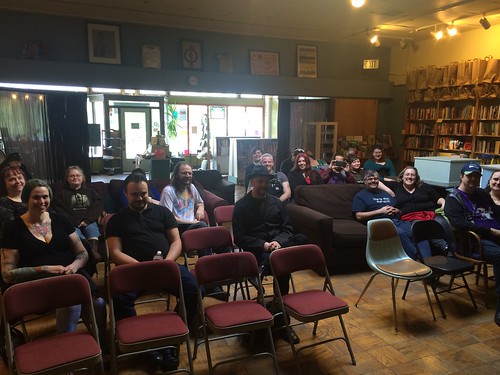
And they showed up in San Diego:
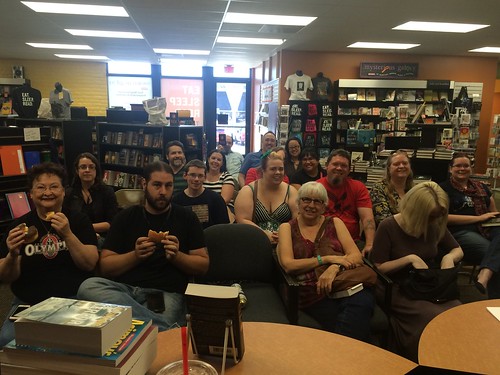
And holy fuck, eighty of you showed up in San Francisco:
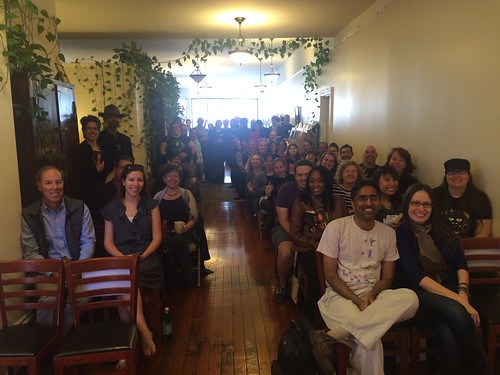
And the weird thing is that these photos are underrepresenting the number of people who showed up. Every time I started to read, more stragglers showed up to fill seats. It was both intimidating and awesome.
Because FLEX is a book that deals a lot with donuts, I brought donuts at every stop in the tour: Top Pot was so amazingly supportive that when I told them I was buying donuts for my first book tour, they squeed and gave me an extra box:

And Portland’s Voodoo doughnuts were legendary as promised (the only other time I had them they’d been sitting on a plane for a cross-country trip, and you need to have them fresh):

Richard Feldman brought me such imposingly large donuts that merely lifting them to your mouth was like doing reps:

Though I ate every donut with the grand and glorious future of a man who was determined to gain weight:

And Technophobia brought me cupcakes to change it all up.

And in San Francisco I had delicious Aebleskivers, which aren’t technically donuts but a form of Scandinavian pancakes. I just love saying “Delicious Aebleskivers,” though.

I bought too many goddamned books at great indie bookstores (and yes, each of these books has been personally recommended to me at one point or another, and Afterparty turned out to be a great read):
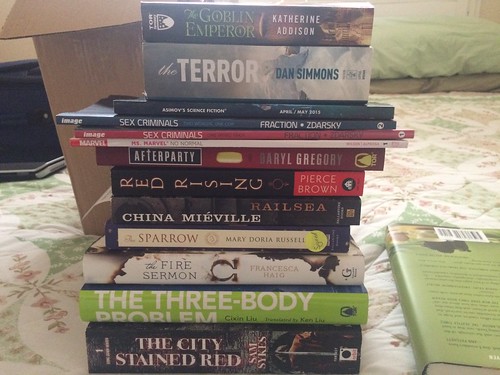
Gini didn’t care about books, though. She was born and raised on the West Coast, and when she got to the coast she ran wild in her element, reminding me of why I love her so:

Me, I was just happy to see otters (and Gini will be making me an otter quilt!):

I wore my suit at every tour stop, and I looked fabulous:

And hey, you wanted to see my Flex-themed nails? Here they are.
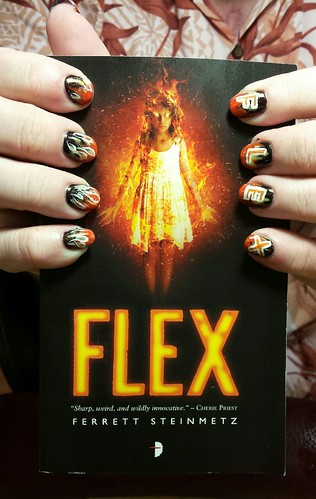
But the best part was getting to see all my friends. There are too many to show here (and God, I’ll get complaints about the length of this entry as it is), but I did get to show people at San Francisco the woman who inspired much of Valentine DiGriz’s look, Renee, who sends me fashion photos an awful lot:

And I got my mini-Clarion reunion.

Oh, yeah: and I personally numbered every single book I signed to someone (generics stock-signings didn’t count), and eventually I topped out with #286, which went to Daniel Starr, who gave one of the earliest critiques of Flex.
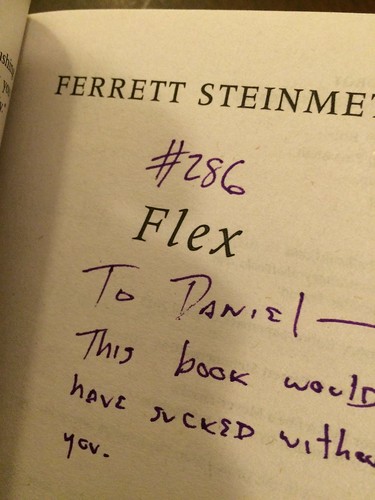
(I’ll actually be continuing the numbers when I sign at Penguicon in a few weeks, and I owe my nieces a few signed copies that’ll actually put the final temp-tally at #290, but that’s where I stop for now.)
But now I am home. And tired. And manacling myself to work again. And this has been wonderful, and I thank you all for the wonderful showings-up, and the dinners out, and the crammed-in coffees, and the hugs, and the beauty you showed me when I was tired and you loved me anyway.
And the delicious Aebleskivers.
The delicious, delicious Aebleskivers.
All About Where You Place The Frame: On The Sad Puppies' Hugo Victory
So let’s say you really like playing chess, so you start a chess club. Every week, you get together with your buddies to move those black and white pieces across the chessboard. Because you want to encourage the best chess players to thrive, you offer a valuable prize to the person who wins the most games.
Eventually, someone figures out that chess players don’t play as well when they’re distracted. These people decide to engage in psychological warfare – playing purposely slow to annoy their opponent, insulting them between moves, wearing T-shirts containing photoshopped pictures of their opponent’s mothers in pornographic positions, blaring them with foghorns when they’re deepest in concentration.
“It’s not in the rules you’ve created!” these people say, and in fact it isn’t. You have not, in fact, created a rule stopping them from sending forged emails to their strongest opponents to tell them the tournament is cancelled today. What happens is that soon, your chess club is filled with people who achieve victory with all sorts of creative techniques, and your club stinks of donkey dung because the latest distract-an-opponent craze is to wear a ghillie suit smeared with mule shit.
“We’re winning,” they say, when people complain, and this is true. “You just don’t like losing.”
Yet what they’re winning at largely has nothing to do with chess. Psychological warfare is as old as, well, warfare. Yes, perhaps you can snag a victory by taunting your teenaged opponent until they break down in tears and resign the game, but it’s difficult to argue that this win is the result of your skills at the game of chess. You could win any game under these rules with these tactics.
Worse, what happens is that your chess club now attracts the sort of people who don’t really give a crap about chess, but in fact just like watching people suffer. Your club becomes filled with people who actually dislike chess, but they do very much like the idea of making those snooty chess players pay for showing up.
Week by week, this chess club becomes less and less about chess, and more and more about inflicting psychological torture. The game is diminished by those who seek victory at all costs. There are still wins on the books, but those wins become increasingly cheapened, because now the game’s frame has expanded from “win using the skills unique to chess” to “win using a variety of very old techniques, most of which require only a rudimentary knowledge of chess.”
The people who actually like chess drift away, not wanting to endure so much agony for a win that contains a very small amount of playing the game they love.
The chess club, if it survives, can barely be said to be called a chess club. Perhaps an endurance club with chessboards, yes, but not a chess club.
The reason I say this is because Brad Torgerson said an astonishingly stupid thing the other day on his Sad Puppy victory at the Hugos:
Best SP3 quote yet: “I’ve said it before, I’ll say it again. I am endlessly amused by people who claim to love democracy until somebody they don’t like turns out to be better at it than they are.”
Now, in case you’re not familiar with the Sad Puppies slate, here’s a brief summary I’d encourage you to read, but a briefer summary is this:
- Conservatives get very outraged because the “right people” are not winning the Hugos, and the Hugos no longer reflect the works they want to see nominated.
- They go to GamerGate – those bastions of free thought – and ask them to pony up $50 apiece to vote in the WorldCon nominations, asking them to vote for these exact works, regardless of whether they’ve read them or not. (Brad made a vague, handwavy show of saying “You should read them,” but of course others did not and explicitly said to vote for these line items because it would piss off the liberals.)
- About 200 GamerGate folks, I’m told, rubber-stamped this ballot, and as such, of the supposedly best three Novellas published in 2014, three are from the same man.
And like the home-grown chess club I’ve discussed, this is a victory in the sense that yes, you put your shit-smeared ghillie suit and drove other competitors out of the field. “Voting blocs” are an old tradition, one of the earliest methods to gain victory when you’re not actually that popular, and it’s not that hard to game an open field.
And yet the point of the Hugos is to have the most deserving works voted in. If you legitimately believed that of all the novellas you read in 2014, John C. Wright wrote the best of them, then great! Nominate! I think your tastes are hopelessly narrow, in the same sense I despair whenever some Neil Gaiman fanboy auto-nominates whatever Neil does because ZOMGNEIL, but you’ve got your vote.
But how many GamerGate members do you think read all the novellas and judged them, and how many just voted for whatever Vox Day and company told them to vote for because it’d piss off the liberals?
If you’re voting for the Hugos to “stick it to the Social Justice Warriors,” then, well, you’re not actually achieving victory at the intended purpose. Just as in chess, you have shifted the frame from “Let us nominate the best writings we loved most and think we deserve it” to “Let’s nominate whatever will send a message to liberals that this award is ours.”
Which is, like wearing Photoshopped pictures of someone’s mother to a game to get them to lose, a form of victory. But it’s not victory in the field originally intended. Sure, maybe you didn’t like what got nominated before, but mostly what won was because people you didn’t like were enthusiastic about the work. Brad is claiming, facetiously and erroneously, that Scalzi and Stross somehow stuffed the ballot box by dint of being popular people – and it’s always been a flaw in the system that a popular person can sway the vote by bringing certain works to greater visibility – but until this point in the Hugo Awards, nobody had specifically gone and fetched people who specifically had not read science fiction at all in order to make a point in the sci-fi community.
(Or maybe they’d tried before, but now Brad and Larry have the dubious honor of succeeding at it by encouraging Vox Day.)
It’s rather like hiring a bunch of thugs to form a threatening crowd outside your chess club to scare away the other players, and claiming you won this shrunken tournament because of your love of chess. You didn’t. This wasn’t you doing “democracy” better, this was you exploiting rules to change the very nature of what the game consists of.
If you’re stupid enough to conflate “doing democracy better” with “winning,” then gerrymandering and making it illegal for people to vote and all sorts of techniques designed to reduce the number of active voters becomes victory, and you’re “doing democracy better” by reducing the number of people involved, which involves some craniorectal contortion in order to see that as a victory at democracy.
However. There’s a reason you don’t see chess clubs inflicted with these sorts of over-the-top antics. That’s because most chess clubs have a general rule prohibiting Unsportsmanlike Conduct – an often-subjective, umbrella-like rule that says, “Anything that’s not in the rulebook but would pull focus from ‘this is about chess’ to ‘this is about victory at all costs’ is, in fact, illegal as well.”
This is why chess clubs remain, largely, about chess.
(As a side note: before anyone accuses me of being against psychological warfare in games, you may do well to look up my long history of writing about Magic: the Gathering, where I rose to prominence by specifically discussing psychological tactics to manipulate other players into supporting you in multiplayer games. I love using sneaky techniques to steal victories; it’s just that as an experienced player at doing these sorts of things, it doesn’t have much to do with your skill at Magic, which I am at best mediocre at.)
Three Ways You Can Help FLEX Be Successful
So! Some of you have read my novel Flex by now. Many of you even like it! And if you’d like to help me along, there’s three things you can do to help me out.
(I will owe you one (1) hug for helping me out, collectable on demand at our next in-person appearance. Offer does not apply to garbagemen and sewer workers fresh off their shift.)
HELPING #1: WRITE A REVIEW ON AMAZON. EVEN IF IT’S NOT A NICE REVIEW.
Apparently, Amazon is much more likely to sell my book for me if there are over fifty honest reviews. That’s some breakpoint in the mysterious Amazonian algorithms. I’m up to 47 now, so if you’ve read it and you have an opinion, and you have five minutes to spare, writing an Amazon review wouldn’t hurt.
(And I will remind you, it’s okay not to like Flex. Some don’t. They are still cool with me, and honest reviews help drive honest sales. Thanks for giving it a try!)
HELPING #2: IF YOU’RE JOINING ME IN SAN FRANCISCO THIS SATURDAY, CHECK IN AT THE FACEBOOK EVENT.
My gives-no-fucks friend Amy Sundberg created a Facebook event for my Borderlands signing at 3:00 on Saturday, and the more y’all sign up, the better Facebook bugs other people. Also, you can put in requests for donuts. Everyone likes donuts.
HELPING #3: IF YOU HAVE NOT BOUGHT FLEX, GET A COPY FROM B&N.
Barnes and Noble has many copies of Flex hanging about, and they’d like to sell more. So if you feel like getting a copy but have yet to, and it’s not too much trouble, B&N is my mildly-preferred place of purchase. (But really, anywhere you buy it? I’m grateful.)
MARKETING SCHEMATA ENDS. RETURN TO YOUR NORMAL LIFE, O MORTALS.
How To Write Jokes That People Will Laugh At (But You Won't)
Literally the second humor essay I ever wrote was a homophobic, slut-shaming piece of shit.
It was also pretty popular.
I was nineteen, and in college, and had decided to write for the college paper. I loved George Carlin and Lenny Bruce and all of those groundbreaking comedians, so I decided to work as edgy as I could. My first essay, “Religiously Handicapped,” was about how I didn’t know what to do in Church, and to this day I’m still weirdly proud of it – it’s not funny, but it mines a vein of comedy that wasn’t too common back then.
I forget what the second essay was about, but it was where I betrayed myself.
In that essay, I remember mocking the men who offered “relief” to college students in the papers – a proto-Craigslist personals, where dudes sought out other dudes to do dudely things upon. And I mused upon what sorts of reliefs might be offered by dudes to dudes, and made a sketchy comment that was something like, “Ugh, who’d want that kind of relief? No thanks!”
I got a lot of positive responses, because particularly in the late 1980s, making fun of gay men was still pretty fucking funny to most people. Especially to sexually-terrified college dudebros.
Thankfully, I had a handful of gay friends. And they took me aside and told me that the personals were the only way for a lot of gay men to connect in a town like ours that really looked down on homosexual sex, and they had to talk in code like “relief” because most of what they did was borderline illegal, and honestly, Ferrett, that was a pretty dickish joke.
Thing is, I knew all that. Heck, the reason I knew about those personals is that I was tempted by the idea of loose, anonymous sex myself. In truth, my reaction to those ads wasn’t revulsion, but a sort of terrified fascination, a desire to know just what sort of things might happen if I went over to a stranger’s apartment and let him have his way with me.
But you know what played better on campus?
Eeeeyew. That’s what got bigger laughs.
So I made the unfortunate choice to prioritize what I thought people would laugh at over what I personally believed.
This is not an unusual thing, for anyone working in humor. Anyone who wants to be a comedian or a funny writer doubtlessly does so because they’re a fan, and they’ve listened to every album/watched every standup/seen every funny show they can. Comedians have memorized other comedians’ routines, because they dissect them, know what makes them tick.
And they remember vividly where people laughed.
So when you’re just starting out, you often are so desperate to please that you drift into autopilot and make a gag that you don’t believe in that’ll go over well. Fat chicks and sluts get laughs. Up North, a cheap “Oh, those stupid redneck Southerners!” draws inevitable chuckles, just as I suspect there’s some boilerplate dumb prissy yankees jokes going on down South.
It’s the moral equivalent of making the “What’s with the airline meals?” jokes – you can get laughs because a lot of the audience shares that experience, but is that really what you’re amused by? And you see that in a lot of the earliest known works of famous comedians – Louie CK’s first special is pretty mundane. He’s making gags that are kinda funny, because he’s gotten talented enough to make jokes, but they are not yet his jokes.
A good comedian can get laughs with their material. A great comedian makes jokes that only they could make.
For many, it takes a while to learn that you don’t have to go for the laugh.
Early on, a lot of people are just happy to get a positive reaction. And it’s only later, when you take that positive reaction for mostly granted, that you start to look at what kind of audience you’re amusing, and wonder what the fuck you’re doing. And that’s not just whitebread yok-a-blocks like me; ask Dave Chappelle why he doesn’t like touring any more.
And if you’re skilled, eventually you start to find your voice. I realized that even though everyone else thought fat chicks were a solid target, including my audience, I didn’t have to use them as a punchline because I personally thought BBW women were beautiful. (Hence the reason I put an attractive pudgy woman front-and-center in my book Flex.) I realized that it’d be a lot more interesting if instead of condemning anonymous gay sex, I actually faced it honestly. (And then, growing even wiser, realizing that I had no personal experience with the topic and maybe I should discuss something I had actually done.)
I started to set my own boundaries on what I thought was funny – and I’m no Louie CK, but I have gotten a mild audience that often laughs at my weird-ass jokes. And when you do that, you don’t have to have some sort of come-to-Jesus moment where you beg forgiveness from the audience – you just stop making certain kinds of jokes (and wince a little when That Dude tells you that was the funniest shit, man) and quietly move into new territories, evolving.
The reason I say this is because right now, the new Daily Show host Trevor Noah is taking a lot of beatings for some pretty dumb-ass jokes he did on Twitter, which have been exhumed and are now being trotted about as proof that he’s unfit for the job. And Trevor hammers the “Jew” and “fat chicks” realm embarrassingly well, here. (Though we must also remember that Jon Stewart made some pretty anti-women jokes in early seasons of The Daily Show – almost certainly stemming from that automatic reflex of “They’ll get a laugh.”)
So what’s Trevor actually think these days? I have no idea, actually. I’d never heard of him before the announcement, so I can’t tell you he’s evolved. (The fact that some of these gags are from 2012 doesn’t fill me with extreme hope.) He’s Schrodinger’s host – maybe he’s evolved beyond these crutches of guaranteed laugh-getters, maybe they’re part of his voice. (Because sometimes, you find your actual voice and it’s repellent – something that happens in comedy a lot, too.)
What I am saying is in response to this:
32. Most of us don’t say things like this on twitter because we don’t fundamentally believe them, or aren’t stupid enough to admit it.
— Morgan Leigh Davies (@MLDavies) March 31, 2015
And I think there’s a third option for why someone posted dumb shit like this beyond “We fundamentally believe in the trope” or “Are stupid enough to admit it” – it’s “We knew it’d get a laugh, and thought the laugh was harmless.”
But laughter isn’t harmless. Laughter, directed in the wrong direction, can cripple the weak, rub their face in their own impotence, destroy their sense of self-esteem. That’s why you try to punch up with your jokes – making gags at the expense of people who, frankly, have enough confidence and overweening sense of self that it’s probably a public service to take the piss out of them.
Again, I can’t speak to Trevor myself. But I’ve watched a lot of comedians grow, and by the time they came to my attention they first made some ugly jokes they later dispensed with. And note that was “by the time they came to my attention,” which is to say after enough years working in the field that they got that television appearance they’d hoped for (or that YouTube video that went viral enough). They probably made lots more bad jokes.
I’m not saying everyone does this, of course. Some are lucky enough to refuse to make jokes just for the sake of laughs. They’re usually more compelling voices from the get-go. But a lot of us have to have that moment – several moments – where we go, “Okay, wow, people laughed, but I didn’t. Is that the sort of person I want to be?”
If you’re lucky, you become someone else entirely as part of the process. Someone stronger, more thoughtful, and more moral.
You know. Like the sort of dude Jon Stewart became.

